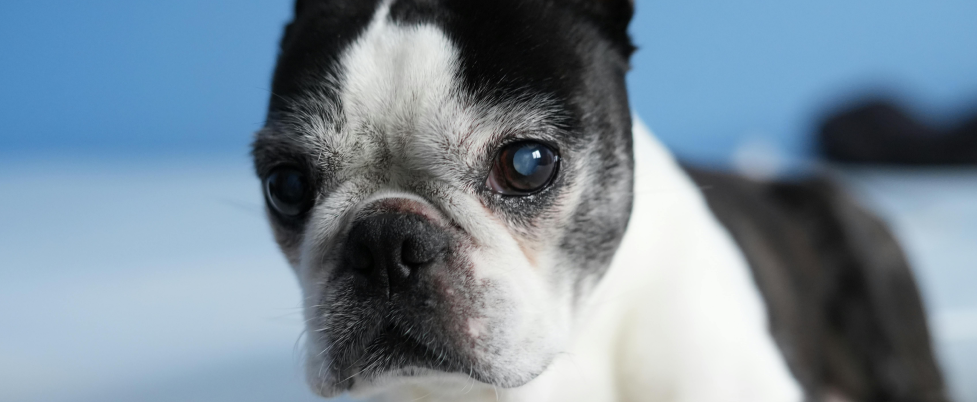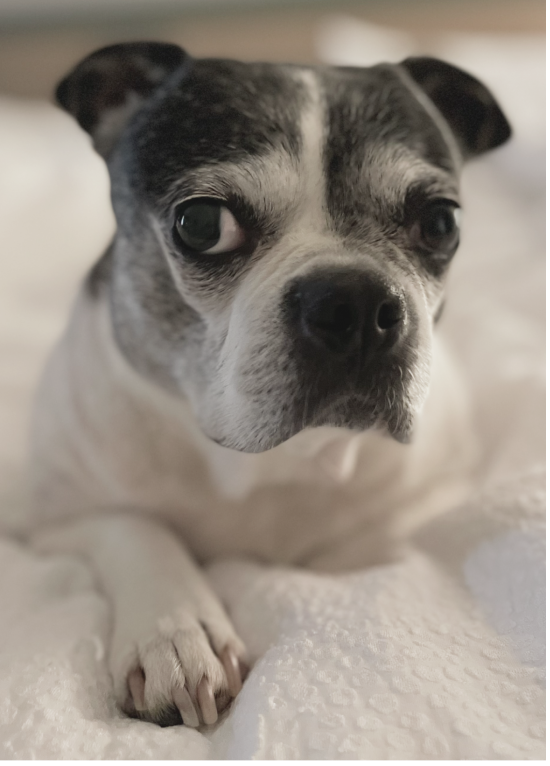LIFE STAGES OF YOUR BOSTON TERRIER / SENIOR LIFE

Disclaimer: I am not a veterinarian. Always consult your vet for specific advice about your Boston Terrier’s health.
Why Joint Health Matters
As Boston Terriers age, their joints naturally undergo wear and tear, leading to stiffness, discomfort, and reduced mobility. Conditions like arthritis and hip dysplasia can make everyday activities—like walking, jumping, or even standing up—more challenging for senior Bostons.
Understanding Joint Issues in Senior Boston Terriers
Goals for Joint Care
By taking proactive steps to support joint health, you can help your Boston Terrier:
- ✔ Stay comfortable by reducing pain and inflammation.
- ✔ Remain active with gentle exercise and mobility support.
- ✔ Enjoy their senior years with an improved quality of life.
In this guide, we’ll explore simple, effective ways to keep your Boston’s joints strong, flexible, and pain-free as they age.
Signs Your Boston May Have Joint Issues:
- Difficulty climbing stairs or jumping
- Limping or favoring a leg
- Stiffness after resting
- Reduced interest in walks or play
Nutrition for Joint Health
As Boston Terriers age, they become more susceptible to joint-related problems that can affect their mobility and overall well-being. Recognizing the signs early can help you take proactive steps to manage discomfort and improve their quality of life.
Common Joint Problems
- Arthritis – Inflammation of the joints, causing stiffness and pain.
- Hip Dysplasia – A genetic condition where the hip joint doesn’t fit properly, leading to degeneration over time.
- Luxating Patella – A condition where the kneecap slips out of place, which can cause temporary lameness or difficulty walking.
Signs Your Boston May Have Joint Issues
- Difficulty climbing stairs or jumping onto furniture – A once-active pup may hesitate or struggle with these movements.
- Limping or favoring a leg – If your Boston is avoiding putting weight on one leg, it may indicate pain or joint instability.
- Stiffness after resting – Your dog may seem slow to get up or move after lying down for extended periods.
- Reduced interest in walks or play – A normally energetic dog may become less enthusiastic about activities they once enjoyed.
If you notice any of these signs, consult your vet for an evaluation and to discuss potential treatments or lifestyle adjustments.
Weight Management
Why It’s Critical:
Maintaining a healthy weight is one of the most important ways to support your senior Boston Terrier’s joint health. Excess weight puts extra strain on their joints, leading to increased pain and mobility issues.
Why It’s Critical
- Extra pounds can accelerate joint degeneration and worsen conditions like arthritis.
- Overweight dogs may struggle with reduced mobility, making it harder to stay active.
- Maintaining a healthy weight helps ease pressure on the joints, improving overall comfort and quality of life.
Tips for Maintaining a Healthy Weight:
- Feed a Balanced Diet – Choose high-quality senior dog food with the right nutrients to support joint health without excess calories.
- Control Portions – Follow feeding guidelines based on your Boston’s weight and activity level. Overfeeding, even with healthy food, can lead to weight gain.
- Monitor Treat Intake – Stick to low-calorie, joint-friendly treats and avoid table scraps, which can contribute to unnecessary weight gain.
- Regular Weigh-Ins – Check your Boston Terrier’s weight monthly to track any changes and adjust their diet or exercise routine accordingly..
By keeping your senior Boston at a healthy weight, you can reduce joint strain, improve mobility, and enhance their overall well-being.
How to weigh your dog at home
PetMD – How to weigh your dog at home
Exercise and Mobility Support
Keeping your senior Boston Terrier active is essential for maintaining joint flexibility, muscle tone, and overall well-being. However, as they age, high-impact activities may become difficult or painful. Gentle, low-impact exercises and mobility aids can help them stay active and comfortable.
Gentle Activities for Senior Bostons:
- ✅ Daily Short Walks – A couple of 10–15 minute walks can help maintain mobility without overexertion.
- ✅ Swimming – A great low-impact exercise that reduces strain on joints while strengthening muscles.
- ✅ Slow-Paced Interactive Play – Engage in gentle games like tug-of-war with soft toys or rolling a ball instead of throwing it.
- ✅ Stretching Exercises – Light, vet-approved stretches can help keep joints limber and reduce stiffness.
Mobility Aids:
- Ramps or Stairs – Help your Boston safely get onto beds, couches, or into the car without jumping and stressing their joints.
- Orthopedic Dog Beds – Provide extra support and cushioning for sore joints, ensuring a restful sleep.
- Dog Strollers – Allow your Boston to enjoy longer outings without overexertion, keeping them engaged and stimulated.
By adjusting exercise routines and incorporating mobility aids, you can keep your senior Boston Terrier active, comfortable, and happy while protecting their aging joints.
Veterinary Care and Treatments
Regular veterinary care is essential for managing joint issues in senior Boston Terriers. Routine check-ups, proper medications, and alternative therapies can help keep your pup comfortable and mobile.
Regular Check-Ups:
- Senior Wellness Exams – Schedule vet visits every 6 months to monitor joint health and detect issues early.
- Weight and Mobility Assessments – Your vet can evaluate weight, muscle tone, and gait changes to adjust care as needed.
- X-Rays or Joint Screenings – If your Boston shows signs of stiffness, limping, or discomfort, imaging tests can help diagnose arthritis, hip dysplasia, or other conditions.
Medications:
- Pain Relievers or Anti-Inflammatories – Vets may prescribe NSAIDs or other medications to reduce pain and swelling.
- Joint Injections – In severe cases, hyaluronic acid or corticosteroid injections can help lubricate joints and relieve pain.
- Supplements with Veterinary Guidance – Prescription joint supplements containing glucosamine, chondroitin, or MSM may help maintain joint function.
Alternative Therapies:
- Physical Therapy or Hydrotherapy – Gentle exercises with a professional can improve mobility and strengthen muscles without putting stress on joints.
- Acupuncture – Helps relieve pain and promote circulation, often used alongside traditional treatments.
- Massage Therapy – Can increase blood flow, reduce stiffness, and improve flexibility in aging joints.
By combining regular vet care, medications, and alternative therapies, you can create a comprehensive plan to support your senior Boston Terrier’s joint health and enhance their quality of life.
Home Adjustments for Joint Comfort
Making simple modifications to your home can greatly improve your senior Boston Terrier’s mobility and comfort, reducing joint strain and preventing injuries.
Non-Slip Surfaces:
- Rugs or Mats – Place non-slip rugs or foam mats on hardwood or tile floors to help your dog maintain traction and prevent slips.
- Carpeted Ramps – Use gentle ramps or steps to help your Boston access couches, beds, or cars without jumping.
Raised Food and Water Bowls:
- Reduce Neck and Shoulder Strain – Elevated bowls can make eating and drinking easier for dogs with joint pain. However, some research suggests raised bowls may increase the risk of bloat in certain breeds. Consult your vet before making this change.
Tip on picking the right bowl:
Learn mrore about bloat
Comfortable Rest Areas:
- Orthopedic Dog Beds – Choose a memory foam or orthopedic bed to support joints and relieve pressure points.
- Warm, Quiet Spots – Place your dog’s bed away from drafts or cold floors, ensuring they stay warm and comfortable.
- Extra Cushioning – Add soft blankets or padded mats in their favorite resting areas for extra comfort.
By making these small but meaningful home adjustments, you can greatly enhance your Boston Terrier’s daily comfort, keeping them safe and supported in their senior years.
Preventing Further Joint Damage
Protecting your senior Boston Terrier’s joints requires consistent care and thoughtful adjustments to their daily routine and environment. Here’s how to keep them comfortable while minimizing further wear and tear.
Daily Habits:
- Keep Them Active (But Not Overexerted) – Regular, gentle movement helps maintain joint flexibility and muscle strength. Stick to short, low-impact activities like slow walks or indoor play.
- Watch for Signs of Worsening Pain – Be mindful of stiffness, limping, reluctance to move, or changes in behavior that could indicate increased discomfort.
- Routine Check-Ins – Keep a journal tracking their mobility and discuss any concerns with your vet.
Environmental Considerations:
- Avoid Cold, Damp Conditions – Chilly and wet weather can exacerbate arthritis symptoms. Keep your Boston Terrier dry and warm during outdoor trips.
- Provide Extra Warmth in Winter – Offer cozy blankets, heated pet beds, or dog sweaters to help ease joint stiffness.
- Limit Jumping and Hard Landings – Use ramps or stairs to prevent stress on their joints when getting on furniture or in and out of the car.
By maintaining gentle activity, a joint-friendly environment, and proactive care, you can help prevent further joint deterioration and keep your Boston Terrier as comfortable and mobile as possible.
FAQs: Joint Health for Senior Bostons
How do I know if my Boston’s supplements are working?
Look for gradual improvements in mobility, such as:
- Less stiffness after resting
- Increased willingness to walk or play
- Reduced signs of discomfort, like limping or hesitation
If there’s no improvement after a few weeks, consult your vet about adjusting the dosage or trying a different supplement.
Can my senior Boston still enjoy playing fetch?
Yes, but keep sessions short and avoid excessive jumping
- Keep sessions short and at a gentle pace
- Play on soft surfaces like grass or carpet to reduce impact
- Roll the ball instead of tossing it high to avoid jumping or sudden stops
When should I consider pain medication for my Boston’s joints?
If your dog shows persistent discomfort, such as:
- Difficulty standing up or lying down
- Limping even after rest
- Avoiding walks or play
Talk to your vet about anti-inflammatory medications, pain relievers, or alternative therapies to improve their quality of life.
Are there natural ways to support joint health?
Yes! Consider:
- Omega-3-rich foods (like fish oil) for inflammation
- Turmeric (with vet approval) for natural pain relief
- Gentle massages and stretching to ease stiffness
By staying proactive and adjusting their routine as needed, you can help your senior Boston stay comfortable and mobile well into their golden years! 🐾
Conclusion: Keeping Your Senior Boston Moving with Ease
Prioritizing your senior Boston Terrier’s joint health ensures they stay happy, active, and comfortable in their golden years. By providing proper nutrition, maintaining a healthy weight, and incorporating gentle exercise, you can help protect their joints and mobility.
Regular vet checkups, mobility aids, and home adjustments also play a key role in keeping your Boston pain-free and engaged in daily activities. With the right care and attention, your Boston can continue enjoying their favorite moments—whether it’s a leisurely walk, a cozy nap, or a game of fetch—well into their senior years.
A little extra care goes a long way in giving your Boston the happy, comfortable life they deserve! 🐾❤️

Additional resources
Canine health foundation
Other articles by this author

“Hi! I’m Weezie, a spirited Boston Terrier / French Bulldog mix and self-proclaimed expert on everything Boston.